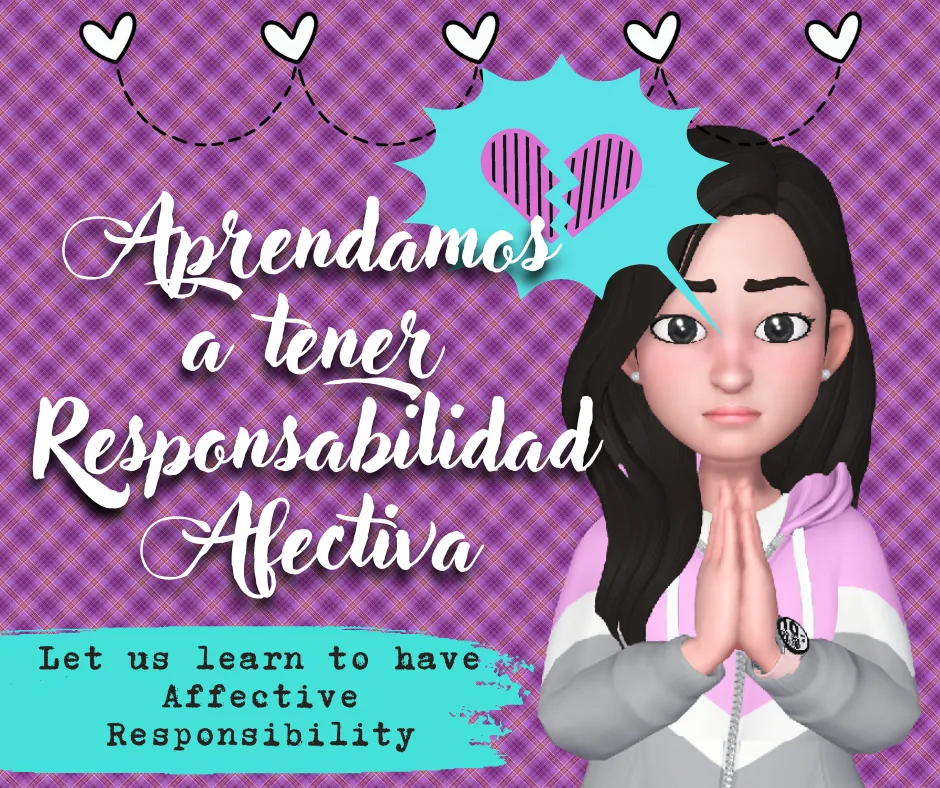

¡Saludos amigos! el día de hoy vengo a hablarle de un tema muy importante en lo que refiere a mantener relaciones personales sanas, de cualquier tipo y que, tal vez, muchos no conozcan, pero deberían para mantener una adecuada salud mental independientemente de con quien se relacionen.
Antes de que nos adentremos en este término que les puse en la portada: Responsabilidad Afectiva vayámonos por lo más sencillo, el significado de las palabras, para poder explicarles con claridad a que se refieren.
**Greetings friends! Today I am here to talk to you about a very important topic in terms of maintaining healthy personal relationships, of any kind, which many may not be aware of, but should be in order to maintain proper mental health regardless of who they relate to.
Before we get into this term I put on the cover: Affective Responsibility let's go for the simplest, the meaning of the words, in order to explain to you clearly what they refer to.
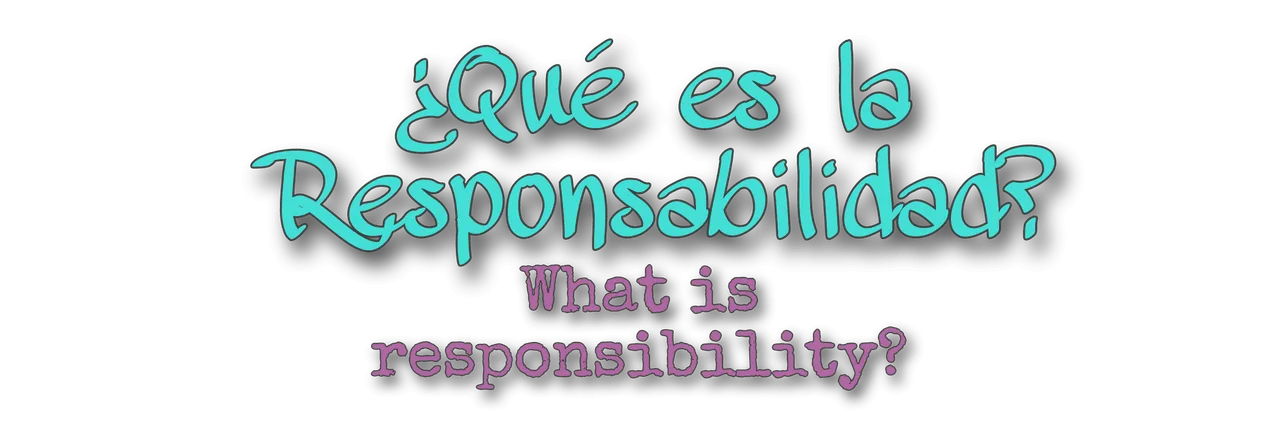
Según la RAE el término que más se adapta a este ámbito es "Capacidad existente en todo sujeto activo de derecho para reconocer y aceptar las consecuencias de un hecho realizado libremente."
According to the RAE the term that best fits this field is "Capacity existing in every active subject of law to recognize and accept the consequences of a freely performed act.”

Igualmente, la definición más relacionada a este punto del que les vengo a hablar sería según la RAE: "Perteneciente o relativo al afecto."
Esto nos lleva a un tercer término que investigar:
Likewise, the definition most related to this point I have come to talk about would be according to the RAE: "Pertaining to or relating to affection."
This brings us to a third term to investigate:
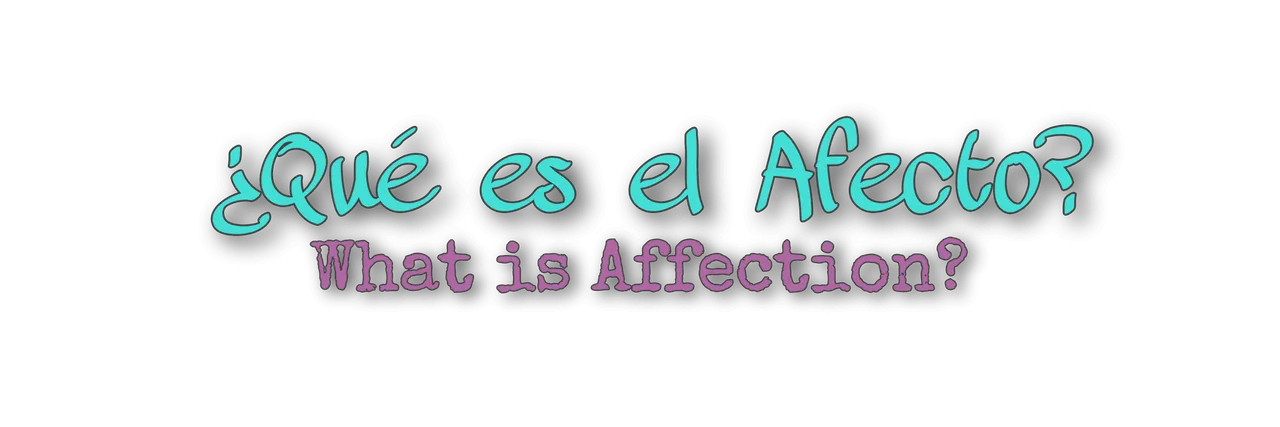
Según la RAE"Adjetivo de Inclinado a alguien o algo."
Y, por último, la más importante:
RAE"Adjective of inclined to someone or something".
And finally, the most important:
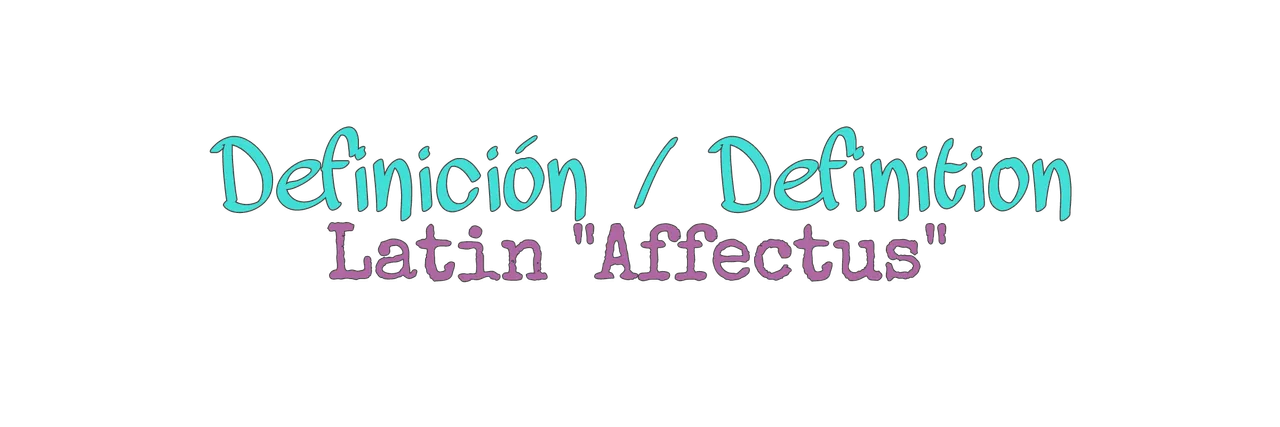
RAE"Cada una de las pasiones del ánimo, como la ira, el amor, el odio, etc., y especialmente el amor o el cariño."
Basándonos en esos términos que establece La Real Academia Española entonces La Responsabilidad Afectiva Sería algo así como: "La capacidad que tienen las personas de reconocer y aceptar las consecuencias de los actos derivados de la expresión de sus emociones (cualesquiera que sean) hacia las personas a las que les tiene afecto."
RAE”Each one of the passions of the spirit, such as anger, love, hate, etc., and especially love or affection".
Based on these terms established by The Royal Spanish Academy, then Affective Responsibility would be something like: "The capacity that people have to recognize and accept the consequences of the acts derived from the expression of their emotions (whatever they may be) towards the people to whom they have affection. "

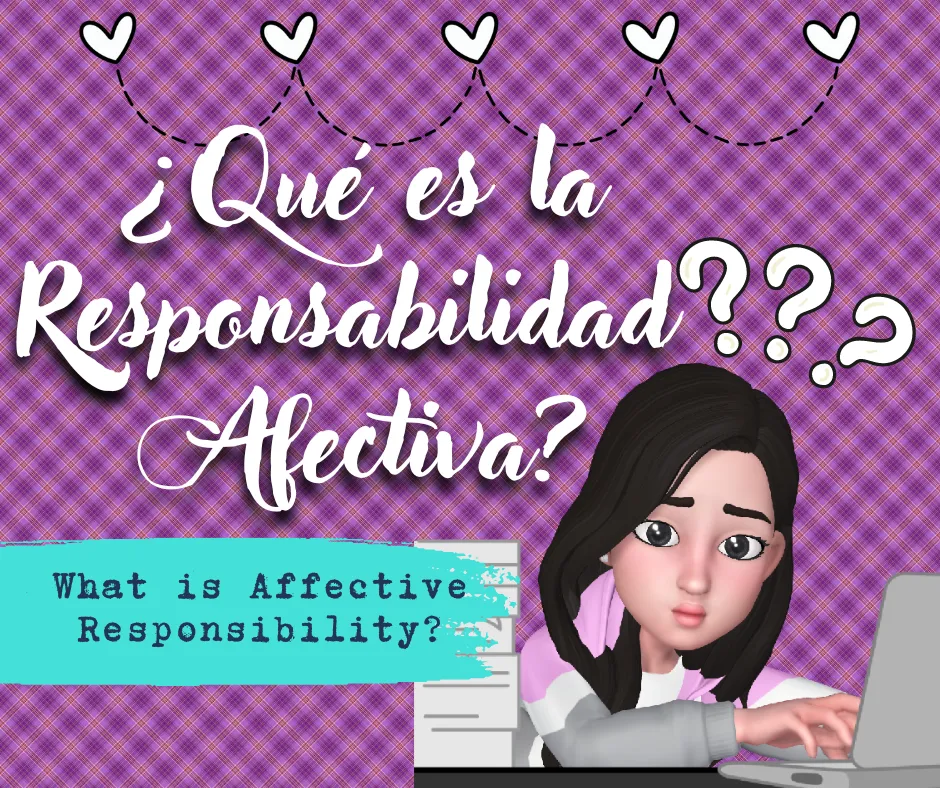

Realmente La Responsabilidad Afectiva, es un término creado en Psicología derivado de esos del diccionario y se basa en tener responsabilidad sobre las consecuencias que se derivan de nuestros actos y la expresión de nuestras emociones sobre los demás.
Básicamente es un término creado para mantener relaciones interpersonales sanas donde no solo importen nuestros sentimientos, sino que además importen los sentimientos de los otros, para que a la hora de expresarnos tomemos en cuenta cómo piensan esos otros, evitando de esta forma decir o hacer cosas que puedan causar un daño innecesario en los demás.
Este término sirve de premisa para echar un poco por tierra eso que muchos usan para escudarse de sus errores cuando dicen: "eso es lo que tu interpretas de lo que yo estoy diciendo, no lo que yo quise decir" frase actualmente muy usada cuando existe alguna discusión y una de las partes dice palabras o frases hirientes con toda la intención, pero quiere hacer parecer responsable al otro de lo que está interpretando y sintiendo.
Es bien sabido que la interpretación de las situaciones y las actitudes de las personas por parte de los otros individuos se lleva a cabo en base sus experiencias, sus conocimientos, sus emociones, pero también influyen otras muchas cosas más, para algo existen los 5 sentidos y por algo todo se integra a nivel cerebral ¿o no? Es para percibir e interpretar el entorno tomando en cuenta aspectos tanto objetivos como subjetivos.
Es decir, no es que la mayoría de la gente anda percibiendo por ahí en su alrededor mundos de fantasía o personajes irreales que surgen de la nada. Por eso, no siempre podemos responsabilizar a la "interpretación de las palabras o acciones" como el culpable de un sentimiento de dolor que causen sobre alguien más.
But, actually Affective Responsibility, is a term created in Psychology derived from those in the dictionary and it is based on having responsibility for the consequences that derive from our actions and the expression of our emotions on others.
Basically it is a term created to maintain healthy interpersonal relationships where not only our feelings matter, but also the feelings of others, so that when we express ourselves we take into account how those others think, thus avoiding saying or doing things that may cause unnecessary harm to others.
This term serves as a premise to throw a little bit to the ground that many use to shield themselves from their mistakes when they say: "that's what you interpret what I'm saying, not what I meant" phrase currently widely used when there is a discussion and one of the parties says hurtful words or phrases with full intention, but wants to make the other seem responsible for what he is interpreting and feeling.
It is well known that the interpretation of situations and attitudes of people by other individuals is carried out based on their experiences, their knowledge, their emotions, but also influence many other things, for something there are the 5 senses and for something everything is integrated at the brain level, isn't it? It is to perceive and interpret the environment taking into account both objective and subjective aspects.
That is to say, it is not that most people go around perceiving fantasy worlds or unreal characters that appear out of nowhere. Therefore, we cannot always blame the "interpretation of words or actions" as the culprit for a feeling of pain they cause on someone else.

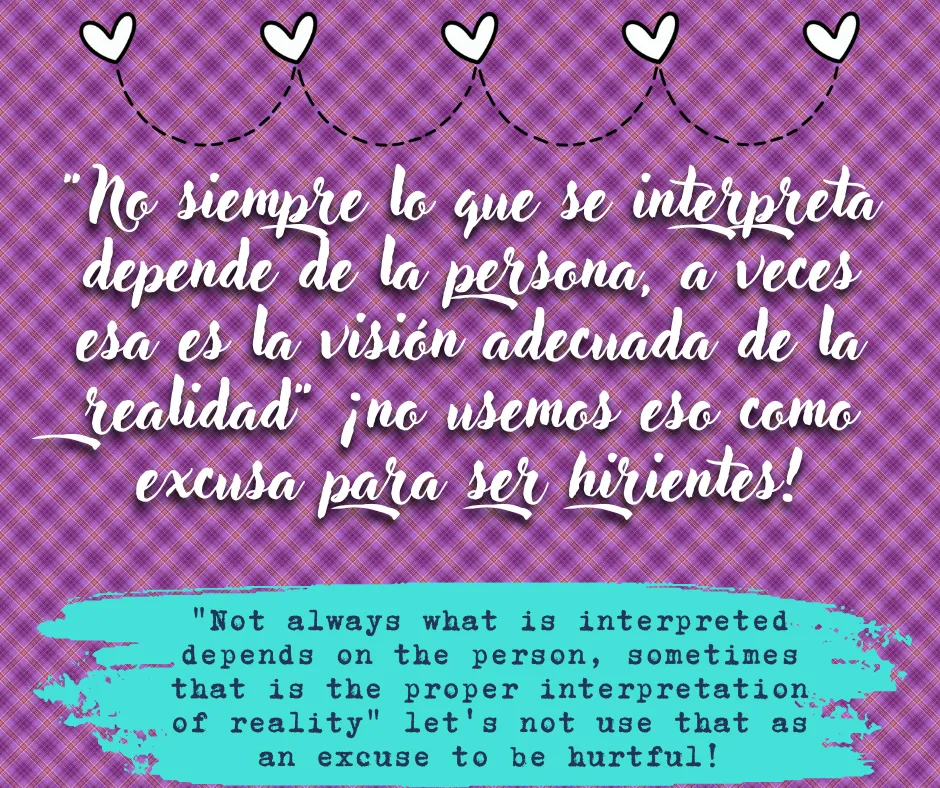

Alejándonos un poco de ese panorama tóxico y asumiendo que cuando hablamos de relaciones personales afectivas hay verdaderos sentimientos de amor invertidos, lo ideal es ser lo más asertivo posible a la hora de comunicarnos para evitar causar un mal al otro con quien tenemos esa relación.
Esto quiere decir que (en vista a que realmente te importa la persona con la que estás hablando y no quieres lastimarlo) lo más importante a la hora de comunicarte con ella es hacerlo de una forma empática, sin ambigüedades y procurando siempre dar a entender tu mensaje de la forma más clara posible.
Todo esto, por supuesto, evitando el uso de palabras hirientes como, por ejemplo: "dramático", "exagerado", "infantil", "inmaduro" o usando actitudes que puedan lesionar emocionalmente al otro; como, por ejemplo, irse en medio de un intercambio de opiniones o decir que ¡ya no quiere hablar más del tema! y que ¡no vas a volver a hacerlo posteriormente tampoco!
Moving away from this toxic panorama and assuming that when we talk about affective personal relationships there are true feelings of love invested, the ideal is to be as assertive as possible when communicating to avoid causing harm to the other person with whom we have that relationship.
This means that (since you really care about the person you are talking to and do not want to hurt him/her) the most important thing to do when communicating with him/her is to do it in an empathic way, without ambiguities and always trying to make your message as clear as possible.
All this, of course, avoiding the use of hurtful words such as, for example: "dramatic", "exaggerated", "childish", "immature" or using attitudes that can emotionally hurt the other person; such as, for example, leaving in the middle of an exchange of opinions or saying that you don't want to talk about it anymore! and that you are not going to do it again later either!

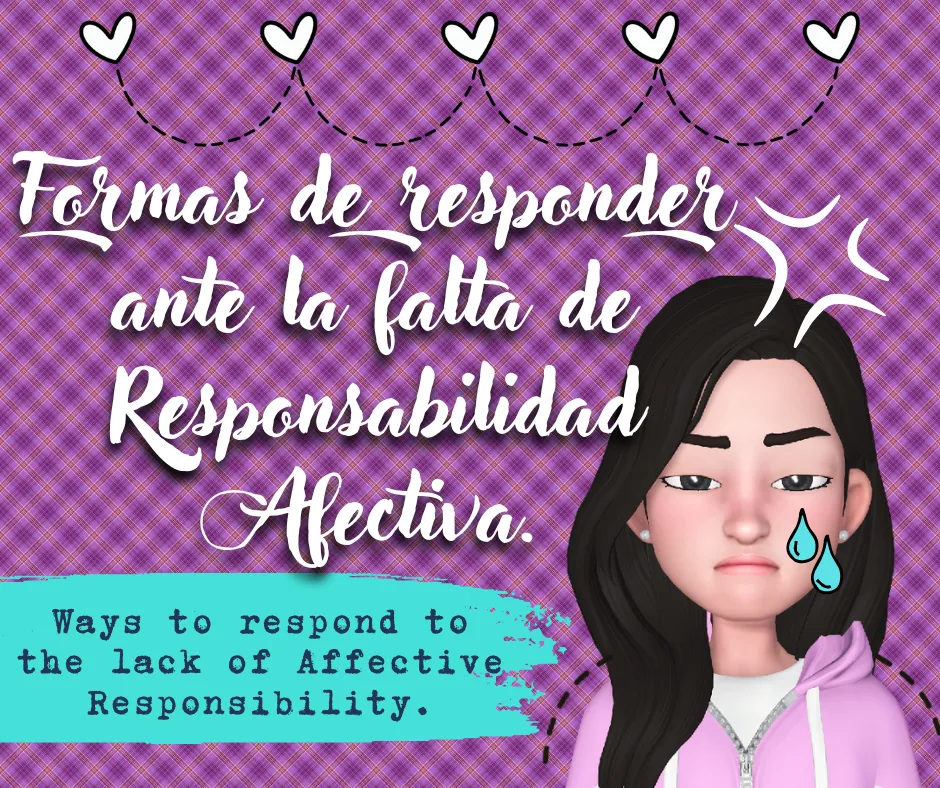

El ser ofensivo con las palabras y las acciones ¡en definitiva! es una forma de NO tener Responsabilidad Afectiva hacia el otro y por ende hay una alta probabilidad de que la relación se vuelva insana, porque hay 2 formas de que la otra persona pueda responder ante esas palabras o acciones expresadas de forma hirientes de parte de quien quiere:
Actuar exactamente igual que el otro y basar la relación en solo una especie de "confrontación" permanente sobre lo que piensan y sienten cada uno y cuál de las dos partes debe prevalecer, donde, evidentemente, abundará la toxicidad y las agresiones verbales y psicológicas.
Hacer que la otra persona se sienta cohibida ante la actitud hiriente del otro, lo cual hará que ella no exprese lo que siente o piensa debido al temor de desencadenar esa respuesta hiriente del otro; lo cual generará que en algún momento la relación solo se balancee en una sola dirección, se perderá el equilibrio y finalmente dejará de funcionar, porque la parte afectada no soportará el daño constante y en algún momento llegará a su límite emocional.
Existe una tercera opción (la que menos queremos que ocurra) y es que la persona que recibe la expresión de emociones y pensamientos hirientes, se acostumbre a ello y termine siendo un tipo de violencia psicológica, donde una de las partes tendrá miedo constante de expresarse, se sentirá permanentemente lastimada, pero no lo dirá por temor a la respuesta contraria, generará un apego muy tóxico y la relación continuará en los mismos términos que han tenido desde siempre hasta que el problema escale cada vez más.
El dar a entender que lo que está sintiendo el otro es una exageración a tu forma de comunicación, es aceptable de vez en cuando, cualquiera comete errores y es posible que esa otra persona esté muy sensible en un determinado momento y esté malinterpretando lo que estás expresando, pero si el asunto se vuelve constante o tienes antecedentes de que te ha ocurrido con anterioridad con otras parejas, entonces es momento de que te evalúes a ti mismo y veas si no eres tú el del problema y no esa otra persona.
Nadie quiere causarle daño a quien quiere, y a cualquiera le puede pasar que no sepa manejar la forma de expresar sus emociones. No todos manejan el mismo conocimiento en Inteligencia Emocional que otros, no todos tienen los mismos niveles de empatía, no todos están en la capacidad de analizar tanto sus propias actuaciones desde afuera, es un aprendizaje que lleva tiempo y se alcanza después de una profunda introspección.
Lo importante de todo esto que les estoy diciendo es que en algún momento se den cuenta, que puedan hacer algo por aprender de sus errores, lo cual implica un cambio en sí mismos y por consiguiente en su forma de actuar con quienes les importan.
Being offensive with words and actions is definitely a way of NOT having Affective Responsibility towards the other and therefore there is a high probability that the relationship becomes unhealthy, because there are 2 ways in which the other person can respond to those words or actions expressed in a hurtful way by the one he/she loves:
1.Acting exactly the same as the other and basing the relationship on just a kind of permanent "confrontation" about what each one thinks and feels and which of the two parties should prevail, where, obviously, toxicity and verbal and psychological aggressions will abound.
2.Making the other person feel self-conscious before the hurtful attitude of the other, which will make him/her not to express what he/she feels or thinks due to the fear of triggering that hurtful response from the other; which will generate that at some point the relationship will only swing in one direction, the balance will be lost and finally it will stop working, because the affected party will not bear the constant damage and at some point will reach its emotional limit.
3.There is a third option (the one we least want to happen) and that is that the person who receives the expression of hurtful emotions and thoughts, gets used to it and ends up being a type of psychological violence, where one of the parties will be constantly afraid to express themselves, will feel permanently hurt, but will not say it for fear of the opposite response, will generate a very toxic attachment and the relationship will continue on the same terms they have always had until the problem escalates more and more.
To imply that what the other person is feeling is an exaggeration of your way of communicating is acceptable from time to time, anyone makes mistakes and it is possible that the other person is very sensitive at a certain time and is misunderstanding what you are expressing, but if the issue becomes constant or you have a history of it happening to you before with other partners, then it is time to evaluate yourself and see if it is not you who is the problem and not that other person.
No one wants to hurt the one they love, and it can happen to anyone who doesn't know how to express their emotions. Not everyone has the same knowledge in Emotional Intelligence as others, not everyone has the same levels of empathy, not everyone is able to analyze their own actions from the outside, it is a learning process that takes time and is achieved after a deep introspection.
The important thing about all this that I am telling you is that at some point you realize, that you can do something to learn from your mistakes, which implies a change in yourself and therefore in the way you act with those who matter to you.

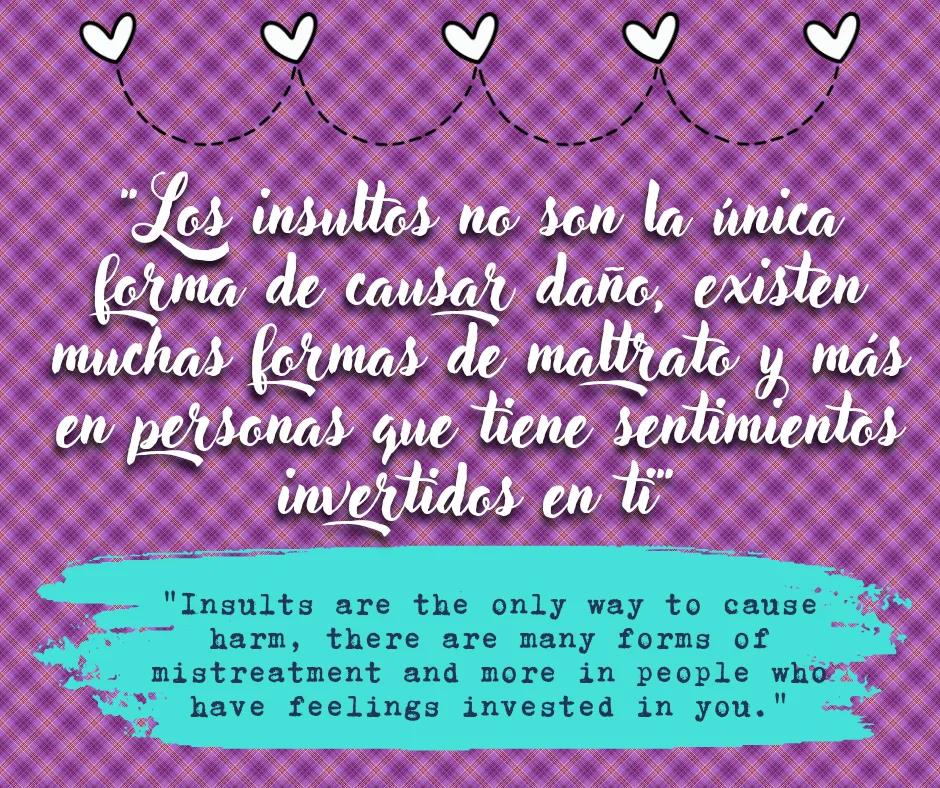

Es fácil para los desconocidos hacer enojar a otros, ya vemos por ahí detrás de los teclados como muchos dicen cosas hirientes solo por decirlo, muchos ni siquiera han visto en toda su vida a esa persona a la que les están escribiendo un comentario ofensivo, lo hacen solo por molestar o sencillamente expresan lo que quieren sin ningún tipo de filtro porque no le importa lo que esa persona piense de ellos. Estas personas tienen cero Responsabilidad Afectiva hacía el otro, porque no comparten ningún vínculo afectivo.
Pero en las relaciones interpersonales, bien sea: amistades, familiares o de pareja, existen vínculos de amor. Lo menos que queremos es hacerle daño a quienes nos brindan su cariño y valoración. Por ende, lo lógico, es que si esa persona (que sabes que te quiere) te está diciendo que estás siendo muy dura con ella, que lo que le dijiste le dolió, o no te lo expresó, pero notas el cambio en su actitud después de escuchar o leer tus palabras, lo que deberías hacer es replantearte si eso que hiciste o dijiste no causó un efecto distinto al que buscabas.
Quiero creer que evidentemente no quieres lastimar a nadie, no lo haces adrede, pero eso no te exime del daño, porque el conocer a una persona a través del tiempo te hace ir entendiendo qué palabras o acciones tuyas puedan causarle daño a esa otra persona mejor que al principio cuando la empezaste a conocer.
Esto último se los digo porque deben tener muy claro de que existe mucha variedad de personalidades en el mundo, algunas son más tolerantes a ciertas actitudes, pero otras no tanto, por eso en la medida en la que avanza el tiempo en las relaciones se hacen más fuertes o débiles los lazos y se basan en eso, en cuanto más se van conociendo y comprendiendo unos a los otros.
It is easy for strangers to make others angry, we see out there behind the keyboards how many say hurtful things just to say it, many have not even seen in their entire life that person to whom they are writing an offensive comment, they do it just to annoy or simply express what they want without any filter because they do not care what that person thinks of them. These people have zero Affective Responsibility towards the other, because they do not share any affective bond.
But in interpersonal relationships, whether: friendships, family or couples, there are bonds of love. The least we want is to hurt those who give us their love and appreciation. Therefore, the logical thing is that if that person (who you know loves you) is telling you that you are being too hard with her, that what you said hurt her, or she did not express it, but you notice the change in her attitude after hearing or reading your words, what you should do is to rethink if what you did or said did not cause a different effect than the one you were looking for.
I want to believe that you obviously do not want to hurt anyone, you do not do it on purpose, but that does not exempt you from the damage, because knowing a person over time makes you understand what words or actions of yours may cause harm to that other person better than at the beginning when you started to know him/her.
I say this last point because you must be very clear that there is a great variety of personalities in the world, some are more tolerant to certain attitudes, but others not so much, that's why as time goes by in relationships, bonds become stronger or weaker and are based on that, the more you get to know and understand each other.

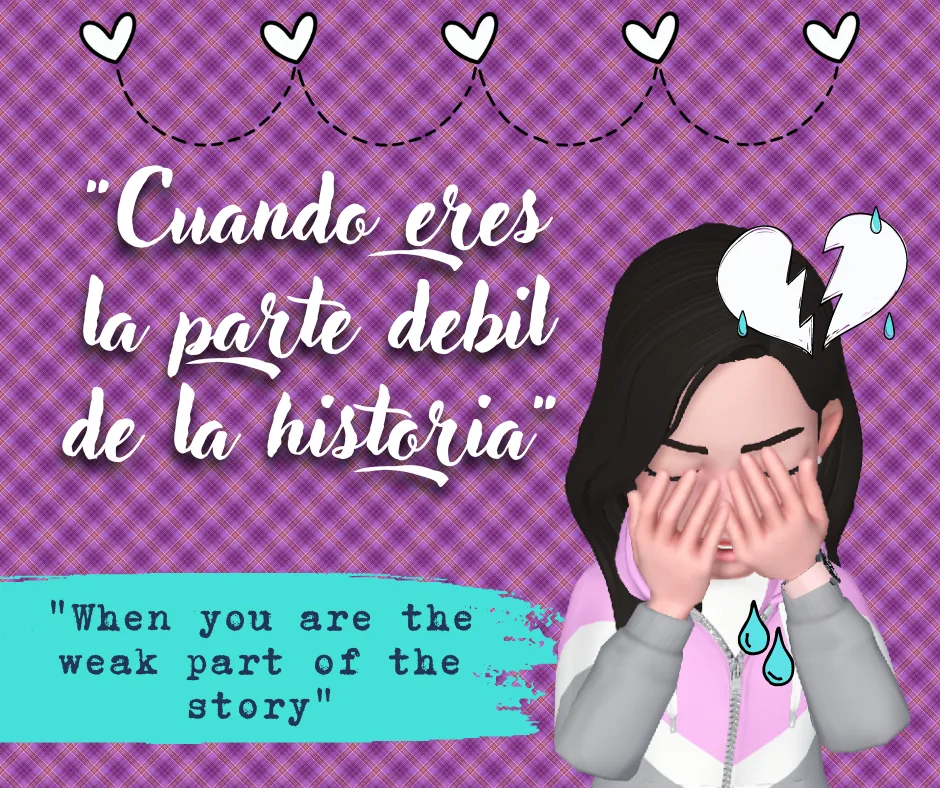

Si eres el otro lado de la relación y eres el que recibes la falta de Responsabilidad Afectiva de la persona que quieres, lo ideal es que se lo des a entender; verbaliza cómo te sientes por lo que te está diciendo o cómo está actuando contigo; toma muy en cuenta que así seas diferente a los demás, la otra parte ¡debe respetar tus emociones! y sí, aun así, continúa actuando igual en reiteradas oportunidades, entonces ya puede pasar a ser una forma de maltrato emocional para ti y lo vas a saber por lo desvalorizado, triste, solo y lastimado que te vas a sentir.
Para esa persona tal vez no es gran cosa, pero para ti sí, y ¡eso está bien! no todos tenemos porque sentir a la misma intensidad que los demás ni tener el mismo grado de tolerancia, así que no te sientas mal por sentirte cómo te sientes por esas pocas o muchas palabras; probablemente tu autoestima haya caído demasiado y tu salud emocional también, lo cual hará que cada vez seas más sensible, te duela más cada palabra, porque has aguantado demasiado y has rebasado tus límites emocionales, así que, antes de llegar a eso, es mejor retirarse.
Está bien dar oportunidades, yo soy de las personas que piensa que cada quien aprende a su propio ritmo y por sí mismo, por eso pienso que podemos dar oportunidades a la otra persona de darse cuenta de lo que hace; no te voy a mentir será ¡MUY difícil! pero si quieres a esa persona, tal vez, merezca la pena el esfuerzo armándote de demasiada paciencia y fuerza de voluntad, pero OJO CON ESTO: ¡debes poner un límite! si después de rebasar ese límite de oportunidades aún continúan los problemas ¡aléjate! te vas a causar mucho daño emocional si sigues ahí.
Y ¡resalto! esto lo digo yo muy personalmente basándome en que hay muchas personas incapaces de notar sus propios problemas por sí solos, algunos tienen otros muchos problemas que le impiden ver ese y, como una persona que busca ayudar a todos por igual, siempre opto por dar oportunidades antes de ser tan radical para tomar decisiones.
Pero ¡créame amigos! Les aseguro que muchos especialistas ante el riesgo que implica para la salud mental les sugerirán que ¡se alejen de inmediato! porque corren el riesgo de destruirse emocionalmente por tratar de soportar todo aquello y luego puede que les cueste ¡demasiado! recuperarse, así que tomen en cuenta esto último que te digo a la hora de decidir qué hacer, porque, a fin de cuentas, son ustedes los que deciden.
Y es que, tristemente, amigos existe una alta probabilidad de que esa persona no note lo que hace mal, independientemente de lo que tú hagas; por eso hablo de las oportunidades limitadas. Pocas personas harán cambios porque otros se los intenten ver necesarios, solo lo harán cuando ellos mismos noten sus problemas, por eso es difícil que ocurra eso que tú quieres que pase, que es que entienda el dolor que está causando en ti.
Estará únicamente en la otra persona darse cuenta con el transcurrir del tiempo del error que comete; así como existe la posibilidad de que sencillamente no quieran cambiar ¡por nada, ni por nadie! es una forma de autodefensa de su ego, de prevalecer lo que decidan para sí mismos basados en sus necesidades y nada más; así que, tal vez, dirán que eres un dramático, un exagerado, que lo que dices está mal, que él tiene la razón y que solo amplificas todo lo que él hace, haciéndote sentir cada vez peor.
If you are the other side of the relationship and you are the one who receives the lack of Affective Responsibility from the person you love, the ideal is that you let them understand; verbalize how you feel about what they are saying or how they are acting with you; take into account that even if you are different from others, the other party must respect your emotions! and if, even so, they continue to act the same way repeatedly, then it can become a form of emotional abuse for you and you will know it by how devalued, sad, lonely and hurt you are going to feel.
For that person it may not be a big deal, but for you it is, and that's okay! not all of us have to feel at the same intensity as others or have the same degree of tolerance, so do not feel bad for feeling the way you feel because of those few or many words; probably your self-esteem has fallen too much and your emotional health too, which will make you increasingly sensitive, each word hurts more, because you have endured too much and have exceeded your emotional limits, so, before it comes to that, it is better to withdraw.
It is good to give opportunities, I am one of those people who think that everyone learns at their own pace and by themselves, so I think we can give opportunities to the other person to realize what they do; I'm not going to lie to you it will be VERY difficult! but if you love that person, maybe, it is worth the effort arming yourself with too much patience and willpower, but BEWARE OF THIS: you must set a limit! if after exceeding that limit of opportunities the problems still continue, walk away! you will cause yourself much emotional damage if you continue there.
And I stress! I say this very personally based on the fact that there are many people unable to notice their own problems on their own, some have many other problems that prevent them from seeing that one and, as a person who seeks to help everyone equally, I always choose to give opportunities before being so radical in making decisions.
But believe me friends! I assure you that many specialists, given the risk to your mental health, will suggest that you walk away immediately! because you run the risk of destroying yourself emotionally by trying to endure all that and then it may cost you too much! to recover, so take into account this last thing I tell you when deciding what to do, because, after all, you are the ones who decide.
And sadly, friends, there is a high probability that this person will not notice what he or she is doing wrong, regardless of what you do; that's why I talk about limited opportunities. Few people will make changes because others try to see them as necessary, they will only do it when they themselves notice their problems, that is why it is difficult for what you want to happen to happen, which is that they understand the pain they are causing you.
It will only be up to the other person to realize with the passing of time the mistake he/she is making; just as there is the possibility that they simply do not want to change, not for anything, not for anyone! It is a form of self-defense of their ego, to prevail what they decide for themselves based on their needs and nothing else; so, perhaps, they will say that you are a dramatic, an exaggerator, that what you say is wrong, that he is right and that you only amplify everything he does, making you feel worse and worse.

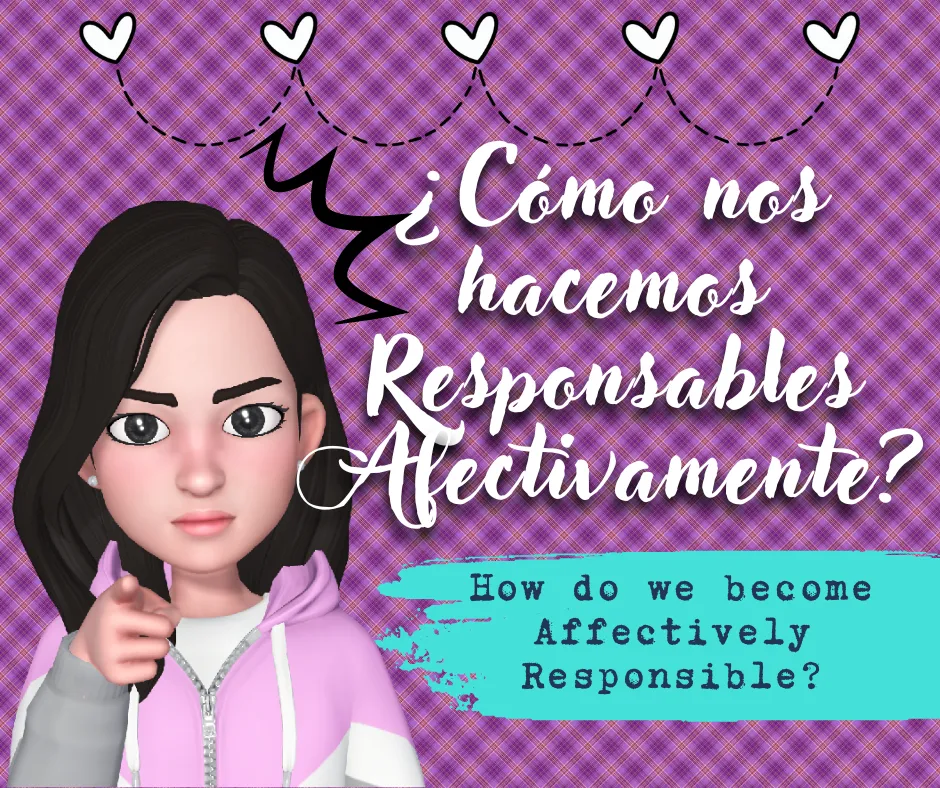

La comunicación; mediante la expresión hacia el otro de lo que nos hacen sentir sus acciones y sus palabras debería hacer que el otro, al no querer hacer daño a quien quiere, busque otra forma de hacerlo tal vez no está acostumbrado, pero si su intención es tener una relación saludable y duradera, intentará no seguir haciendo el daño y por ende modificará su forma de actuar y expresarse con la otra persona.
Ser sincero y transparente, diciendo lo que realmente piensan o quieren con la relación ¿No quiere algo duradero?, ¿No quiere ser exclusivo?, ¿no quiere aún lo suficiente?, ¿Ya no sientes lo mismo? Respondiendo a estas preguntas la otra persona sabrá a qué atenerse y decidirá si quiere o no mantenerse en la relación.
Ser coherente con lo que se quiere, piensa y se hace; si se desea mantener la relación entonces ¡debe poner de sí mismo! intentar pensar en el otro, en que necesita que el otro se sienta bien para estar bien el mayor tiempo posible a su lado; si no es así, entonces debe decirlo y así se evitarán los daños colaterales; Recuerda que una relación de parejas es de ¡dos! Ambos deben importar por igual. El compromiso debe ser bilateral.
Establezcan acuerdos, las relaciones de pareja son un equilibrio entre las partes, es como un documento donde establecen que quiere uno y que quieren el otro, nunca prevaleciendo más los deseos de uno que los del otro. Los deberes son de ambos.
Trata al otro como te gustaría que te trataran a ti, con respeto y empatía. En las relaciones de cualquier tipo deben prevalecer estos principios, al desaparecer alguno de ellos, no habrá un buen soporte y por ende habrá una alta probabilidad de que éstas terminen fracturándose con el tiempo al no intentar entender la posición del otro, ni lo que vale
Fortalece la confianza entre ambos; el hacer que el otro tenga inseguridades sobre ti no hará más que generar confusiones y por ende mayor probabilidad de reacciones inadecuadas ante determinados comportamientos que pueden lucir ambiguos o con doble interpretación, no hagas cosas que se presten para malos entendidos.
Cuidar del otro; si quieres tener una relación sana y funcional debes entender que la responsabilidad afectiva no es solo pensar antes que actuar, es que debes actuar en consonancia con lo que dices y eres. Si quieres a una persona y es tu pareja el deber es dedicarle el tiempo que merece, no aparecer un día y al otro no, por ejemplo, porque no hay coherencia entre lo que eres para esa persona y como estás actuando.
Ser una pareja es un compromiso, es velar por el otro, es querer que el otro quiera estar a tu lado y sentirse bien con eso, recibir, dar amor y comprensión, es el desear un futuro con el otro donde ambos se sientan valorados. Este es uno de los elementos fundamentales de la Responsabilidad Afectiva, entender que una pareja amerita un cuidado especial porque por algo ambos se escogieron para estar juntos.
- Communication; by expressing to the other what their actions and words make us feel should make the other, not wanting to hurt the one they love, look for another way to do it maybe they are not used to it, but if their intention is to have a healthy and lasting relationship, they will try not to keep doing the damage and therefore will modify their way of acting and expressing themselves with the other person.
- Be honest and transparent, saying what you really think or want with the relationship Don't you want something lasting, don't you want to be exclusive, don't you still want enough, don't you feel the same anymore? By answering these questions the other person will know where they stand and decide whether or not they want to stay in the relationship.
- Be consistent with what you want, think and do; if you want to keep the relationship then you must put of yourself! try to think of the other, that you need the other to feel good to be well as long as possible by your side; if not, then you must say so and thus collateral damage will be avoided; Remember that a couple relationship is of two! Both must matter equally. The commitment must be bilateral.
- Establish agreements, Couple relationships are a balance between the parties, it is like a document where they establish what one wants and what the other wants, never prevailing more the desires of one than the other. Duties belong to both.
- Treat the other as you would like to be treated yourself, with respect and empathy. In relationships of any kind these principles must prevail, if any of them disappear, there will not be a good support and therefore there will be a high probability that these will end up fracturing over time by not trying to understand the position of the other, nor what it is worth.
- Strengthen the trust between both of you; making the other have insecurities about you will only generate confusion and therefore a higher probability of inappropriate reactions to certain behaviors that may look ambiguous or with double interpretation, do not do things that lend themselves to misunderstandings.
- Caring for each other If you want to have a healthy and functional relationship, you must understand that affective responsibility is not only thinking before acting, it is that you must act in consonance with what you say and are. If you love a person and he/she is your partner, the duty is to dedicate the time he/she deserves, not to show up one day and not the next, for example, because there is no coherence between what you are for that person and how you are acting.
- To be a couple is a commitment, is to take care of the other, is to want the other to want to be by your side and feel good about it, to receive, give love and understanding, is to desire a future with the other where both feel valued. This is one of the fundamental elements of Affective Responsibility, to understand that a couple deserves special care because there is a reason why both were chosen to be together.

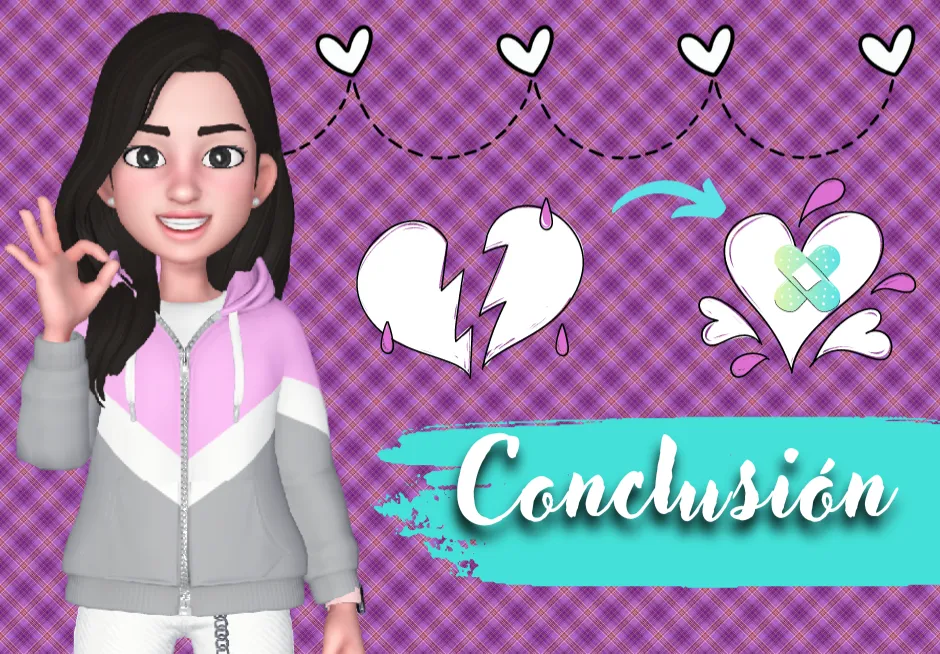

Para finalizar amigos, recuerden que nadie nace aprendido, todos estamos en proceso de crecimiento cada día de nuestras vidas, podemos rectificar las veces que sean necesarias para convertirnos en mejores personas; algunas personas han pasado por momentos difíciles que los han hecho ser de alguna forma, es su mecanismo de protección, pero si llega un punto de que ese mecanismo hace daño a otros, deben hacerse conscientes de él e intentar cambiarlo.
Cuando se empieza a tener una relación con otros, cuando debemos vincularnos afectivamente con otras personas, amigos, familia o pareja debemos dejar de pensar ya solo en nosotros, ahora debemos ser conscientes de las consecuencias de nuestras conductas sobre esas personas. Ahora ya no eres tú solo, otros están en contacto contigo y tus conductas van a repercutir sobre ellos, así que ¡por favor! ¡no andes por ahí sin hacerte responsable afectivamente con ellos!
Por último, independientemente de si tienes una relación estrecha con esa persona o no, todos somos seres humanos, y el ser humano es social por naturaleza, es necesario convivir con otros, por eso es importante aprender a expresarse y a entender lo que generan las palabras y acciones sobre los demás, de esta forma se evitarás conflictos innecesarios.
Finally friends, remember that no one is born learned, we are all in the process of growing every day of our lives, we can rectify as many times as necessary to become better people; some people have gone through difficult times that have made them be in some way, it is their protection mechanism, but if there comes a point that this mechanism hurts others, they must become aware of it and try to change it.
When you begin to have a relationship with others, when we must bond affectively with other people, friends, family or partner, we must stop thinking only about ourselves, now we must be aware of the consequences of our behaviors on those people. Now you are no longer alone, others are in contact with you and your behaviors will have repercussions on them, so please don't go around without being affectively responsible with them!
Finally, regardless of whether you have a close relationship with that person or not, we are all human beings, and human beings are social by nature, it is necessary to live with others, so it is important to learn to express yourself and to understand what your words and actions generate on others, this way you will avoid unnecessary conflicts.



Imagen editing and separators
[ESP] Todas las imágenes fueron creadas en Canvas App y Picsart App por @liveofdalla usando recursos gratuitos de ambas Apps.
[ENG] All images were created in Canvas App and Picsart App by @liveofdalla using free resources from both Apps.
Mis redes sociales | My social Networks
|Twitter|Facebookr|Instagram|
